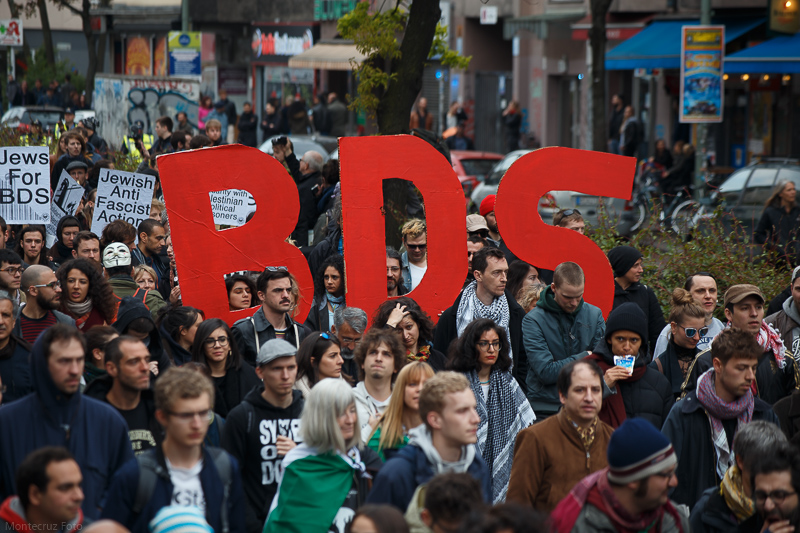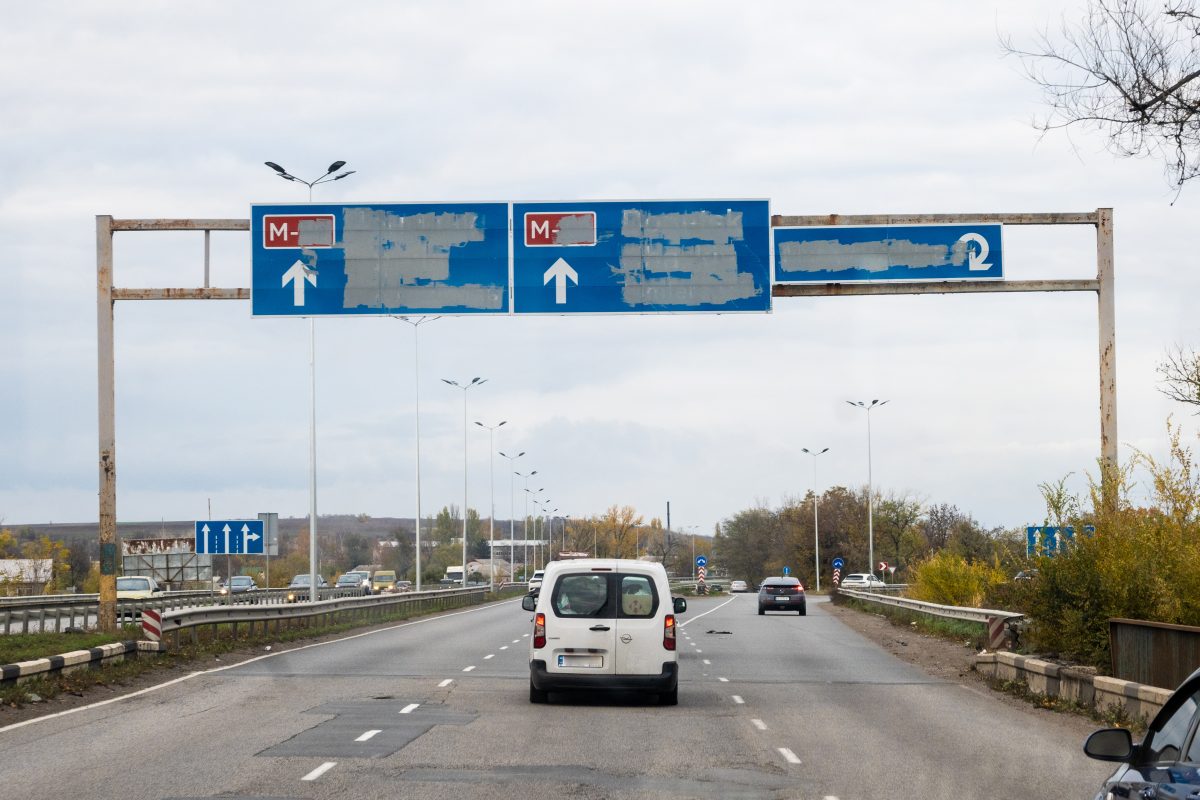On Saturday, November 15, the Berlin regional conference of Die Linke will host a decisive vote on whether the party will support two crucial international movements: BDS (Boycott, Divestment, and Sanctions), and PACBI (Palestinian Campaign for the Academic and Cultural Boycott of Israel).
As the name suggests, the BDS movement is a Palestinian-led nonviolent boycott and divestment campaign that seeks to apply international pressure on Israel to comply with “Israel’s obligations under international law,” including withdrawal from occupied territories, equality for Arab-Palestinian citizens, and the right of Palestinian refugees to return.
The PACBI is a part of this broader BDS movement, launched in 2004 by Palestinian academics and intellectuals. PACBI specifically calls for a boycott of Israeli academic and cultural institutions––not individuals––which it holds complicit in perpetuating Israeli occupation and oppression of Palestinians, in order to isolate Israel internationally and pressure it to change its policies.
Support for BDS and PACBI would mark a historic turning point for Die Linke, long plagued by internal contradictions and a legacy of alliances with Zionist figures, going as low as defending “Israel‘s right to exist” via the German infamous “Staatsräson” (“reason of state”). This moment could help redefine the party’s identity as a credible, anti-imperialist force committed to Palestinian self-determination and international solidarity—a much-needed shift that could reverberate across Germany’s broader social and political landscape.
The Party’s Fading Revolutionary Roots
Founded as a merger of the East German socialist tradition and the Western anti-capitalist left, Die Linke once represented a revolutionary alternative to establishment politics. Over time, however, it has undergone a profound ideological transformation. Once an anti-imperialist force against oppression worldwide, the party’s politics have aligned ever more with reformist, social-democratic tendencies—most troublingly with a pronounced pro-Zionist current that undermines its foundational principles.
This oxymoron manifests through the “Anti-Deutsch” faction: steadfast antinationalists who are progressive on most issues, except for their deep loyalty to the ethnonationalist state of Israel—a clear cherry-picking of their principles. Being a “Zionist leftist” is as self-contradictory as claiming to be a “leftist racist.”
This contradiction finds expression in old, key figures such as Bodo Ramelow and Dietmar Bartsch, who routinely affirm “Israel’s right to exist” and condemn Palestinian resistance in conciliatory or dismissive terms. Petra Pau, likewise, has adopted a western Eurocentric narrative that labels Palestinian resistance as terrorism—a glaring betrayal of the socialist principles once professed in her upbringing in the GDR. Perhaps most emblematic is Klaus Lederer, whose aggressive defense of Israeli policies, reliance on whataboutism, pinkwashing rhetoric, and repetition of historical revisionism about Palestine have deeply harmed the party’s credibility.
The influential Silberlocken (“silver curls,” suggestive of their advanced age)—Ramelow, Bartsch, and Gregor Gysi—have consistently defended Israel’s position while discrediting Palestinian voices. Ramelow’s proud display of the Israeli flag after October 7, 2023, and Bartsch’s circulation of fabricated atrocity stories illustrate an ingrained pro-Zionist bias. Gysi’s racial insensitivity (including his infamous use of the N-word on live television) and his support for cross-party alliances—from the hard-right CDU to the also militaristic neoliberal Greens—demonstrate a willingness to sideline anti-imperialist positions for opportunistic coalition politics.
For a politician who often invokes Rosa Luxemburg, such posturing represents a complete betrayal of the revolutionary legacy he claims to embody.
The situation has deteriorated to the point that figures with openly reactionary backgrounds are tolerated within a supposedly leftist party. Andreas Büttner, formerly of the CDU and FDP (of all parties), exemplifies the fanatic Zionist wing, publicly backing Israeli territorial claims and military aid—a stance so damaging that members have demanded his expulsion. Similarly, a Leipzig member once known for wearing Israel Defense Forces attire reportedly harassed and intimidated pro-Palestine activists within the party. These aberrations expose Die Linke’s alarming tolerance for elements that clash with the most basic principles of socialist and anti-imperialist solidarity.
Whether they are committed Zionists or opportunists afraid of the misused “antisemite” label, such figures reflect a broader institutional shift: an alignment with German state and NATO narratives masquerading as progressive politics. The fear of losing coalition opportunities with neoliberal and militaristic counterparts—the SPD and the Greens—has often been invoked to justify censorship, disciplinary measures, and the silencing of pro-Palestinian voices.
The Rise of Pro-Zionist Factionalism
In this context, grassroots activists and younger members have repeatedly challenged the dominant pro-Zionist consensus. One of the most egregious examples was the expulsion of Palestinian-German Ramsis Kilani, ordered by Berlin state party leader Katina Schubert and then-co-leader Martin Schirdewan in December 2024. Schirdewan, still co-chair of The Left in the EU Parliament (so far largely silent about Palestine and absolutely silent regarding Israel critique, in contrast to his fellow fraction collegues from other countries or non-white fellow member from the same party), justified the move by citing alleged “glorification of terrorism” under pressure from hard right-wing mainstream media—a familiar tactic used to delegitimize Palestinian solidarity.
A public rally demanding Kilani’s reinstatement, held on October 11, 2025, outside the Karl Liebknecht House—Die Linke’s headquarters—illustrated the depth of internal unrest. Despite strong grassroots support, the party’s disciplinary apparatus has repeatedly delayed any meaningful resolution, a symptom of how unsettled the internal debate over Palestine solidarity remains.
The leadership’s ambivalence—reflected in its hesitations and repeated delays of the BDS and PACBI support vote—reveals the extent of these contradictions. Notably, Die Linke’s lethargic and equivocal response during nearly two years of Israeli mass violence in Gaza has drawn heavy condemnation. While international left movements mobilized in solidarity, Die Linke initially voiced unconditional support for Israel and remained silent or evasive for months. Only under sustained grassroots and public pressure did the leadership finally acknowledge the catastrophic humanitarian crisis unfolding in Gaza.
At the “United for Gaza” demonstration in September 2025, co-chair Ines Schwerdtner faced intense criticism for the leadership’s earlier silence and ultimately issued a public apology. Her counterpart, Jan van Aken, worsened tensions days earlier by refusing to describe Israeli actions as genocide and instead denounced parts of the pro-Palestine movement, even suggesting potential expulsions for members displaying “extremist” solidarity.
Such remarks highlighted not only internal disunity but also a profound ideological estrangement from anti-colonial principles.
Grassroots Resistance and Renewal
Over recent months, the party’s grassroots—especially in migrant-majority districts like Neukölln and Wedding—have carried forward the banner of solidarity. Local associations have organized protests, teach-ins, and community events centered on ending German and Die Linke complicity in Israeli crimes.
A noteworthy example came at the neighborhood festival in Berlin-Neukölln, held at bUm and organized by the district branch of Die Linke, where discussions about Palestine solidarity took center stage. These forums, open to the public, signaled a growing determination to reclaim the party’s direction from above.
Well-known figures such as Ferat Koçak and Özlem Demirel embody this generational and ideological shift. Koçak, elected to the Bundestag in February 2025, stems from activist roots among Berlin’s Kurdish and migrant communities, focusing on climate justice, refugee rights, anti-fascism and anti-racism. Demirel, serving in the European Parliament, has consistently condemned Israeli apartheid and German complicity, drawing vital connections between anti-racism, feminism, and anti-imperialism.
Other standout new and younger voices include Cansin Köktürk, who wore Palestinian solidarity symbols in the Bundestag despite censorship threats and disciplinary proceedings; Nicole Gohlke, one of the few white German MPs demanding an immediate ceasefire and accountability for German arms deliveries; and observers Cem Ince and Lea Reisner, who joined Palestine solidarity demonstrations in Berlin in October 2025 and faced police violence for their participation.
These members and their networks represent the remnants of a genuinely internationalist and principled left within Die Linke.
Their efforts underscore a growing chasm between the old guard—deeply invested in pro-Zionist legitimacy—and a younger, more radical generation that recognizes Palestine solidarity as inseparable from all other liberation struggles. The November 15 conference vote, set against escalating repression of Palestine activism by German authorities, intensifies the need for Die Linke to make an unambiguous choice.
The Broader Significance
Should Die Linke vote to support BDS and PACBI, the decision would resonate far beyond Berlin. It could signal a fundamental course correction—challenging Germany’s stifling consensus that condemns criticism of Israel as antisemitism and exposing the political manipulation inherent in that accusation. It would demonstrate that genuine left politics cannot coexist with colonial apologism and that universalist ethics demand support for Palestinian liberation, not silence before power.
Such a vote could also reshape Germany’s political discourse by reclaiming anti-imperialist language from liberal hypocrisy. It would show that solidarity with Palestine is not an “issue” but a moral and political foundation of any credible left project. The German state‘s historical responsibility, born from the Holocaust, does not excuse contemporary colonialism and ethnic cleansing; it obliges unwavering opposition to all forms of racism and apartheid—including that perpetrated by the Israeli state.
By contrast, continued hesitation or rejection would mark Die Linke’s final descent into centrist liberalism, at best. It would confirm the party’s abandonment of revolutionary internationalism in favor of parliamentary respectability and moral cowardice. Already eroded by electoral decline, leadership crises, and the departure of figures unable to reconcile their positions with the party’s direction, Die Linke would risk becoming politically irrelevant—a vessel for moral compromise rather than conviction.
The upcoming Berlin vote thus holds enormous significance. Whether or not the resolution passes, it will clarify where the party stands: with the oppressed or with the oppressors; with liberation movements worldwide or with imperial narratives disguised as social-democratic rhetoric.
Beyond Symbolism: A Moral Imperative
The debate also exposes how Palestine has become Europe’s most consequential political mirror. In Germany especially, violent state repression of Palestinian activism—bans on protests, censorship of artists, and criminalization of speech—has reached authoritarian depths. Against this backdrop, a partisan alignment with Zionism is not neutral; it is complicity. When activists are detained for waving flags, signs or chanting for liberation, and journalists face defamation for covering Israeli crimes, the insistence that “we cannot intervene” becomes indistinguishable from support for apartheid.
For a left that once invoked anti-colonial solidarity as a moral compass, neutrality today is impossible. Rosa Luxemburg, Frantz Fanon, and Amílcar Cabral taught us that liberation is indivisible. The same capitalist and imperial networks fueling wars from Gaza to the Sahel are upheld by governments that Germany allies itself with—through arms exports and normalized diplomatic cover. If Die Linke cannot oppose this unambiguously, then it forfeits the right to define itself as a leftist party at all.
At a time when Germany’s ruling parties deploy militarism abroad and austerity at home, the left’s silence on Palestine mirrors its broader capitulation. From NATO weapons deliveries to Israel and Ukraine to unconditional support for United States foreign policy, the German establishment has merged moral rhetoric with war economics. Breaking that consensus requires courage—not bureaucratic caution.
As the November 15 conference approaches, the choice before the delegates is stark. Either Die Linke rediscovers its purpose as a movement rooted in emancipatory politics and solidarity—or it becomes just another party defending the status quo.
History will remember which side it chose.




